Walter Gay
Walter Gay (January 22, 1856 – July 13, 1937) was an American painter noted both for his genre paintings of French peasants, paintings of opulent interior scenes and was a notable art collector.
Walter Gay | |
|---|---|
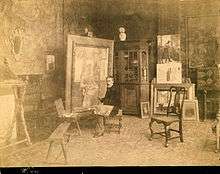 Walter Gay in his studio | |
| Born | 22 January 1856 |
| Died | 13 July 1937 (aged 81) Le Breu Dammarys les Lys, near Fontainbleu, France |
| Nationality | American |
| Known for | Painting, Drawing, Art collector |
Early life
Walter Gay was born on January 22, 1856 in Hingham, Massachusetts into an established New England family. He was the son of Ebenezer and Ellen Blake (née Blood) Gay. His uncle was the Boston painter Winckworth Allan Gay, who introduced the young man to the art community.
Career
In 1876, Gay and his wife moved to Paris, France where he became a pupil of Léon Bonnat. A fellow student during this period was John Singer Sargent with whom Gay developed a friendship.[1] Bonnat encouraged the young artist to travel to Spain, where he studied and copied the work of Velázquez. He also encountered the work of Spanish artist, Mariano Fortuny. These artists became an important influences on Gay's brushwork, use of colour and understanding of light.
Walter Gay received an honorable mention in the Paris Salon of 1885; a gold medal in 1888, and similar awards at Vienna (1894), Antwerp (1895), Berlin (1896) and Munich (1897).[2] He was one of the few artists selected to represent the United States at the Exposition Universelle in Paris in 1889. He became an Officer of the Legion of Honor and a member of the Society of Secession, Munich.[2] During his lifetime, his work was exhibited in every major European city: Antwerp, Berlin, Budapest, Vienna and Paris. In 1904, he was elected into the National Academy of Design as an Associate Academician.
Many young American artists who arrived in Paris in the late 19th-century became Gay's pupils to the extent that the New York Times dubbed him the "Dean of American Artists in Paris." [3] His students who went on to have illustrious careers include: Henry Bacon.
His first compositions were still lifes, followed by depictions of 18th-century French peasant life. Later he shifted to genre scenes of realistic depictions of peasants and factory workers.[4] However, from around 1895, he abandoned such simple peasant scenes, virtually creating a new genre with his depictions of luxurious interiors. He is most noted for these paintings of opulent interiors show-casing French chateaux and chic private homes. These painterly works display the luxurious detail of domestic interiors which included fine porcelain, furnishings, gilt mirrors, paintings and focussed on the "spirit of an empty room" by avoiding the inclusion of figures.[5]
Gay was also a notable collector of artworks. Following his death in 1937, his widow donated some 200 works of Dutch, Italian, English and French paintings, drawings and illustrations to the Louvre indicating something of the collection's importance.[6]
Personal life
He married heiress, Matilda E. Travers, the daughter of William R. Travers, a prominent New York City investor and co-founder of Saratoga Race Course. His wife's fortune allowed the couple to live very comfortably. They divided their time between their country homes and their Paris apartment. In Paris, Gay and his wife lived in an apartment on the Left Bank and in 1907, purchased Chateau Le Bréau on a 300-acre (1.2 km2) walled park near the Forest of Fontainebleau. His wife maintained a diary of the couple's time in Europe.[7]
Walter Gay died at Le Breu Dammarys les Lys, near Fontainbleu on 13 July 1937.[8] His widow remained at their home in France which was taken over by German officers following the German occupation of France during World War II. A virtual prisoner in her own home, Matilda Travers Gay died there in 1943.
Awards and recognition
Gay was created Chevalier Legion of Honor in 1894; Officer Legion of Honor in 1906 and a Commander of the Legion of Honour in 1927. He was also awarded the honour of Life fellow Metropolitan Museum of Art, New York.
Selected works
Works by Gay are represented in many of the world's most prestigious art museums, including: the Luxembourg Museum, the Tate Gallery (London), and the Boston Museum of Fine Arts, the Metropolitan (New York), the Art Institute, the Frick in Pittsburgh, the Carnegie Museum of Art, the Smithsonian American Art Museum, Museum of Brussels, Pinakothecq Museum, Munich, Pennsylvania Academy of the Fine Arts, Albright Art Gallery and the Musée d'Orsay in Paris, France.[9]
- Geraniums, n.d., before 1890
- Hollyhocks, n.d. before 1890
- The Spinners. 1885
- Les Tisseuses, (The Weavers), 1885
- Novembre, Etaples, c. 1885
- The Knife-grinder, c. 1888
- Charity, 1889
- Benedicite (The Blessing) 1889 Museum at Amiens, France.
- Las Cigarreras (Cigar Makers, Seville), n.d., ca 1890
- The Music Room and Dining Room of Eben Howard Gay's House, Boston, 1902
- La Commode, 1905
- La Chaise-Longue, (Room in the Chateau de Bréau, near Paris), c. 1905
- The Chinese Screen, after 1909
- The Artist's Study, Rue de la Universite 1910
- The Open Window - Le Breau, 1910
- The Green Salon, 1912
- Salon of Comptesse Robert de Fitz-James, 1913
- Blue and White, [Dining room of Mrs Josiah Bradlee, Boston], 1913
- Le Grand Salon, Musée Jacquemart-André, ca 1913
- Feu de Cheminée dans un Intérieur, n.d.
- Boudoir, Chateau de Chaalis, 1914
- The Ethan Frome Kitchen, 1922
- The Living Hall, 1928
Gallery
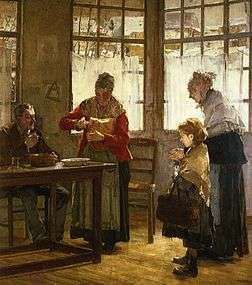 Charity, 1889, Private collection
Charity, 1889, Private collection Interior of Palazzo Barbaro, Venice
Interior of Palazzo Barbaro, Venice Interior at the Chateau du Breau
Interior at the Chateau du Breau Interior with Fireplace
Interior with Fireplace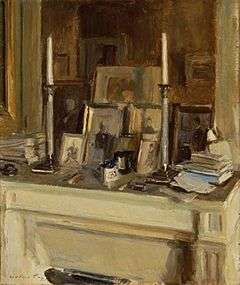 La Cheminée
La Cheminée Galerie des Bustes, Chaeau du Reveillon
Galerie des Bustes, Chaeau du Reveillon%2C_The_Front_Parlor%2C_after_1909._Oil_on_canvas.jpg) The Front Parlor, after 1909
The Front Parlor, after 1909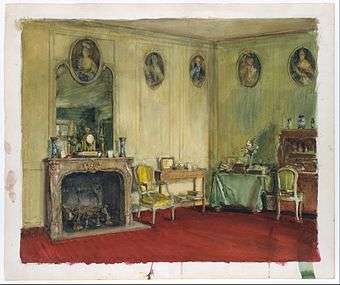 Interior, a watercolor, at the Metropolitan Museum of Art
Interior, a watercolor, at the Metropolitan Museum of Art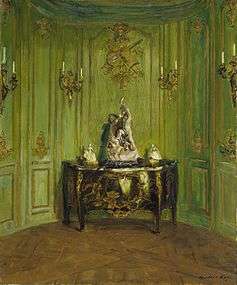 The Green Salon, 1912, at the Metropolitan Museum of Art
The Green Salon, 1912, at the Metropolitan Museum of Art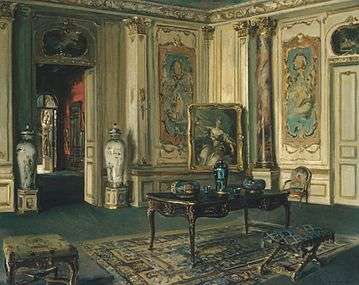 Le Grand Salon, Musée Jacquemart-André, 1913, at the Metropolitan Museum of Art
Le Grand Salon, Musée Jacquemart-André, 1913, at the Metropolitan Museum of Art
References
| Wikimedia Commons has media related to Walter Gay. |
- Specific
- Charteris, Evan (the Hon, Sir), John Sargent, Pickle Partners Publishing, 2016 [E-book edition]; Herdrich, S.L., Sargent, J.S., Weinberg, H.B., and Shelley, M., American Drawings and Watercolors in the Metropolitan Museum of Art: John Singer Sargent, New York, N.Y., Metropolitan Museum of Art, 2000, p.130
-

- Mason, B.S., "Walter Gat: The Master of Poemes Interieurs," American Arts Quarterly, Vol. 29, no. 4, 2012, <Online:http://www.nccsc.net/essays/walter-gay>
- Prelinger, E., The Gilded Age: Treasures from the Smithsonian American Art Museum , New York and Washington, D.C., Watson-Guptill Publications, 2000
- Owens, M., "Paintings of Interiors by Walter Gay and Isabelle Rey," [Review of Impressions of Interiors: Gilded Age Paintings Exhibition at Frick Art & Historical Center in Pittsburgh], Architectural Digest, 31 October 2012,<Online: https://www.architecturaldigest.com/story/frick-pittsburgh-walter-gay-isabelle-rey>
- Owens, M., "Paintings of Interiors by Walter Gay and Isabelle Rey," Architectural Digest, 31 October 2012,<Online: https://www.architecturaldigest.com/story/frick-pittsburgh-walter-gay-isabelle-rey>
- Caldwell, P.V., Walter Gay: Poems d'Intérieurs, 2003
- Marter, J.M. The Grove Encyclopedia of American Art, Volume 1, Oxford University Press, 2011, p. 311
- Catalog of an Exhibition of Oil Paintings and Water-Colors by Walter Gray,1914, <Online: http://www.dalnet.lib.mi.us/dia/collections/dma_exhibitions/1914-3.pdf>